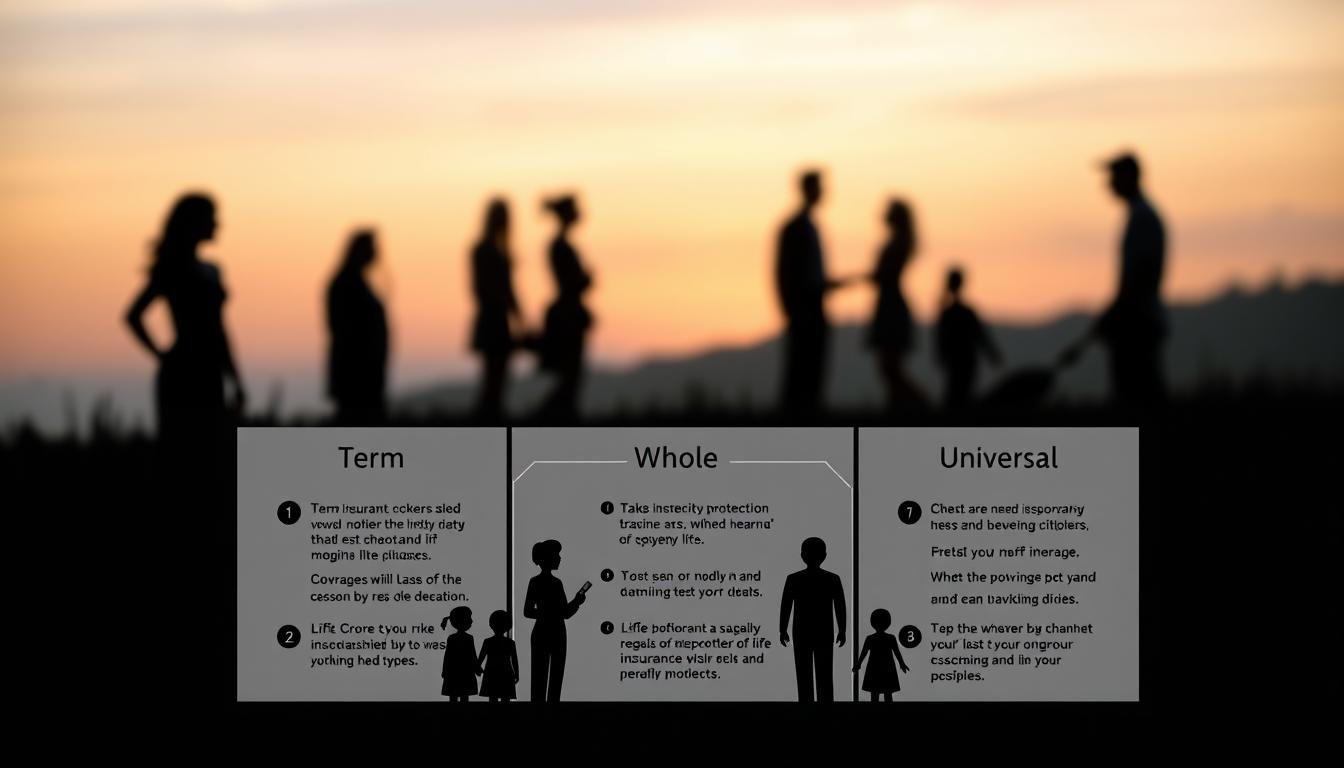Did you know nearly 1 in 5 adults in the U.S. lacks life insurance? This leaves their families at risk of financial trouble.
Getting the right insurance policy does more than just pay out when you pass away. It brings financial security and peace of mind to your family. With many coverage options out there, you can find a plan that matches your needs and budget.
It’s important to understand your options to make a smart choice. By looking into life insurance, you can protect your loved ones and secure your financial future.
Key Takeaways
- Life insurance provides financial security beyond just a death benefit.
- Various coverage options are available to fit different needs and budgets.
- Having the right insurance policy can offer peace of mind for you and your family.
- Understanding your insurance choices is crucial for making an informed decision.
- Exploring life insurance options can help secure your financial future.
Understanding Life Insurance Basics
Life insurance might seem hard to understand at first. But it’s key to keeping your family safe financially. It’s a deal where you pay money to an insurance company. In return, they promise to give your loved ones money when you pass away.
What Is Life Insurance?
Life insurance helps protect your family if you die. It gives your loved ones money, called a death benefit. This money is crucial for their financial future.
“Life insurance is a vital tool for ensuring that your loved ones are financially protected, no matter what the future holds.”
Types of Life Insurance Policies
There are many life insurance policies out there. They cater to different needs and goals. The main types are term life and whole life insurance.
- Term Life Insurance: Covers you for a set time, like 10 or 30 years. It’s great for paying off big expenses, like a house or college.
- Whole Life Insurance: Covers you for life if you keep paying premiums. It also grows a savings part that you can use later.
Key Terminology Explained
Knowing life insurance terms is important. It helps you make smart choices. Here are some key ones:
- Premium: The money you pay for your policy.
- Death Benefit: The money your loved ones get when you die.
- Cash Value: A savings part that grows in whole life policies.
- Beneficiary: The person or group that gets the death benefit.
Learning these basics helps you pick the right policy. It ensures your family is safe and secure.
Why Life Insurance Is Important
Protecting your loved ones is a top priority, and life insurance can help achieve that. It’s more than a financial product. It ensures your family is cared for, even when you’re not there.
Protecting Your Loved Ones’ Financial Future
People buy life insurance to protect their family’s financial future. It provides the financial support they need to keep living well, even without you.
This support can cover many expenses. It helps with daily costs and long-term goals like education and retirement.
Covering Funeral Costs and Debt
Life insurance also covers funeral costs and debts. This eases the financial burden on your loved ones during a tough time.
With a life insurance policy, these costs are taken care of. Your family can focus on grieving without worrying about money.
Leaving a Legacy
Life insurance can also leave a lasting legacy for your loved ones or favorite charities. It’s a way to make a difference even after you’re gone.
When looking at life insurance, it’s key to compare life insurance policies. Also, get insurance quotes from different providers to find the best deal.
Having the best life insurance policies gives you peace of mind. You know your loved ones are protected, no matter what the future brings.
Types of Life Insurance Policies
Life insurance isn’t a one-size-fits-all product. It comes in various forms to suit your unique circumstances and objectives. Understanding the different types of life insurance policies available is crucial in selecting the one that best fits your needs.
Term Life Insurance
Term life insurance provides coverage for a specified period, typically ranging from 10 to 30 years. It’s designed to offer financial protection to your loved ones in case something happens to you during the term. If you outlive the term, the coverage ends, and there’s no payout unless you renew or convert the policy.
This type of insurance is often chosen for its affordability and simplicity. It’s ideal for covering specific financial responsibilities, such as mortgages or educational expenses, that would be challenging for your family to manage if you were no longer around.
Whole Life Insurance
Whole life insurance, also known as permanent life insurance, covers you for your entire lifetime, as long as premiums are paid. It not only provides a death benefit but also accumulates a cash value over time, which you can borrow against or withdraw.
One of the key benefits of whole life insurance is its predictability. The premiums are typically fixed, and the cash value grows at a guaranteed rate. This makes it a stable component of your financial planning.
Universal Life Insurance
Universal life insurance is a flexible premium policy that combines a death benefit with a savings component. It allows you to adjust your premiums and death benefit as your needs change. The cash value earns interest based on current interest rates.
This flexibility makes universal life insurance appealing to those whose financial situations or insurance needs may change over time. It requires careful management to ensure the policy remains funded and in force.
Variable Life Insurance
Variable life insurance is a type of permanent life insurance that allows you to invest the cash value in various investment options, such as stocks, bonds, or mutual funds. The cash value and death benefit can fluctuate based on the performance of these investments.
While variable life insurance offers the potential for greater growth of the cash value, it also comes with investment risks. The policy’s value can decrease if the investments perform poorly.
| Type of Insurance | Coverage Period | Premiums | Cash Value |
|---|---|---|---|
| Term Life | Specified term (e.g., 10-30 years) | Generally fixed, but may increase with age | No cash value accumulation |
| Whole Life | Lifetime | Fixed premiums | Cash value accumulates at a guaranteed rate |
| Universal Life | Lifetime, flexible | Flexible premiums | Cash value earns interest based on current rates |
| Variable Life | Lifetime | Flexible premiums | Cash value can be invested, value fluctuates |
Choosing the right life insurance policy depends on your financial goals, budget, and personal circumstances. By understanding the characteristics of each type, you can make an informed decision that best protects your loved ones and supports your long-term financial plans.
The Benefits of Life Insurance
Life insurance offers many benefits. It provides financial security for your loved ones. It also improves your financial well-being in many ways.
Financial Security
Life insurance gives you financial security. The right insurance policy ensures your family’s financial needs are met, even without you. It covers funeral costs, debts, and living expenses.
Some policies also grow a cash value over time. You can borrow against it or use it for retirement. This boosts your financial security plan.
Peace of Mind
Life insurance brings peace of mind. It protects your loved ones. If you have dependents, it ensures they’re cared for, no matter what.
Tax Advantages
Life insurance has tax benefits too. The death benefit your beneficiaries get is tax-free. They receive the full amount without worrying about taxes.
Some policies also grow a cash value tax-free. This lets you build up your policy’s value without immediate tax worries.
How to Choose the Right Policy
There are many life insurance options out there. Finding the best one for you takes some thought. You need to think about your personal and financial situation.
Assessing Your Insurance Needs
Deciding on the death benefit size is key. It’s about how much you want to leave for your loved ones and what you can afford monthly. Think about your debts, funeral costs, and your dependents’ financial needs.
- Calculate your total financial obligations, including mortgage, loans, and credit card debt.
- Consider your income and how much you can allocate towards premiums.
- Think about your long-term financial goals and how life insurance fits into your overall financial plan.
Comparing Policy Types
There are different life insurance policies for different needs. It’s important to know the differences to make the right choice.
| Policy Type | Description | Key Benefits |
|---|---|---|
| Term Life Insurance | Provides coverage for a specified term (e.g., 10, 20, or 30 years). | Affordable premiums, simple to understand. |
| Whole Life Insurance | Lifetime coverage with a cash value component. | Builds cash value over time, lifetime coverage. |
| Universal Life Insurance | Flexible premiums and adjustable death benefit. | Flexibility in premiums and death benefit, potential for cash value growth. |
Evaluating Financial Strength of Insurers
The financial strength of an insurance company is very important. You want to make sure they can pay out claims when needed.
Check the insurer’s rating from reputable rating agencies like A.M. Best, Moody’s, or Standard & Poor’s. These ratings show if the insurer is financially stable and can meet its obligations.
By carefully looking at your insurance needs, comparing policy types, and checking the financial strength of insurers, you can make a smart choice. This way, you can find a life insurance policy that fits your situation well.
Cost Factors in Life Insurance
Your life insurance rates depend on personal traits and policy choices. Knowing these can help you choose better insurance and save money.
Age and Health Considerations
Age and health greatly affect your life insurance rates. The younger you are, the lower your rates. Health issues can also change your rates. Insurers might ask for medical tests to check your health.
Key health factors include:
- Blood pressure and cholesterol levels
- Family medical history
- Presence of chronic conditions like diabetes
- Lifestyle habits such as smoking or excessive drinking
Lifestyle Choices Impacting Premiums
Your lifestyle choices also matter for insurance rates. Smokers usually pay more because of health risks. Jobs or hobbies that are risky can also raise your rates.
Consider the following lifestyle adjustments to potentially lower your rates:
- Quitting smoking
- Reducing or eliminating high-risk hobbies
- Maintaining a healthy weight and diet
Policy Coverage Amount
The coverage you choose affects your rates. More coverage means higher rates. Young people might start with small, affordable policies that grow as they do.
Think about your debts, funeral costs, and your dependents’ future when picking coverage. It’s key to find the right balance between enough coverage and affordable rates.

Understanding and managing these factors can help you choose better life insurance. This way, you get the right coverage without breaking the bank.
Deciphering Life Insurance Quotes
Life insurance quotes are more than just numbers. They are about your financial security and peace of mind. When you’re looking at life insurance, it’s important to understand your quote. It’s not just about the cheapest premium; it’s about the right coverage for you.
Understanding Premiums
Your life insurance premium is the amount you pay for your policy. It depends on your age, health, lifestyle, and policy type. Understanding how premiums work helps you make smart choices about your life insurance.
Premiums can change based on your medical history, smoking status, and job. For example, health issues might raise your premiums. But a healthy lifestyle could lower them.
Comparing Different Quotes
It’s important to compare life insurance quotes from different providers. It’s not just about the price. Look beyond the premium to the coverage, benefits, and any exclusions or limitations.
- Check the coverage amount and duration.
- Review the benefits and any additional features.
- Understand the terms and conditions.
By comparing quotes, you can find a policy that fits your financial goals and protects your loved ones.
The Importance of Transparency
Transparency is crucial when it comes to life insurance quotes. You need to know what you’re paying for and what you’re covered for. Look for insurers that are transparent about their policies, premiums, and any future changes.
Transparent insurers give clear information about their policies. This makes it easier to make informed decisions. It also builds trust, showing they care about your best interests.
Common Misconceptions About Life Insurance
Many people have wrong ideas about life insurance. They think it only covers certain things, who should get it, and how much it costs.
Life Insurance Is Only for Older Adults
It’s a big mistake to think life insurance is just for older folks. Actually, buying it early can save you money. Young people usually get better rates because they’re healthier.
For example, a 30-year-old non-smoker can get term life insurance at a low price. But, as you get older, the cost goes up, making it pricier later on.
It’s Too Expensive
Some think life insurance is too pricey. But, the cost really depends on your age, health, and policy type. Term life insurance, for instance, can be quite cheap for the young.
| Age | Monthly Premium for $250,000 Term Life Insurance |
|---|---|
| 30 | $15-$25 |
| 40 | $25-$40 |
| 50 | $50-$80 |
I Don’t Need Life Insurance If I’m Single
Being single doesn’t mean you don’t need life insurance. If you have kids, parents, or big debts, it can protect their finances if you’re not there.
Consider this: If you co-sign loans or have a mortgage, life insurance can cover these debts. This prevents financial trouble for your family.
Knowing the truth about these myths can help you choose the right life insurance. Whether you’re young, single, or on a tight budget, there’s a policy for you.
Life Insurance Riders Explained
You can make your life insurance policy fit your needs better by adding riders. Riders are extra benefits or features that can be added to your basic policy. They help enhance its coverage.
What Are Riders?
Life insurance riders are optional features you can add to your policy. They offer extra benefits. You can add them when you buy the policy or later. They let you tailor your coverage to your specific needs.
Common Riders to Consider
There are many types of riders you can add to your policy. Some common ones include:
- Accelerated Death Benefit Rider: Allows you to get a part of the death benefit if you have a terminal illness.
- Waiver of Premium Rider: Stops your premiums if you become disabled or critically ill.
- Accidental Death Benefit Rider: Gives an extra death benefit if you die in an accident.
- Long-Term Care Rider: Helps pay for long-term care, like nursing home care or home health care.
| Rider Type | Description | Benefit |
|---|---|---|
| Accelerated Death Benefit | Receive a portion of the death benefit for terminal illness | Financial support during critical illness |
| Waiver of Premium | Waives premiums during disability or critical illness | Relief from premium payments when needed |
| Accidental Death Benefit | Additional death benefit for accidental death | Extra financial protection for beneficiaries |
Pros and Cons of Adding Riders
Adding riders to your policy can give you extra benefits tailored to your needs. But, it’s important to consider the pros and cons.
Pros:
- Customization: Riders let you customize your policy.
- Enhanced Coverage: They add extra benefits that can be crucial in certain situations.
- Flexibility: Some riders offer flexibility in premium payments or death benefits.
Cons:
- Increased Cost: Adding riders can make your premiums higher.
- Complexity: More riders can make your policy harder to understand and manage.
When thinking about adding riders, it’s key to look at your individual needs and finances. Talking to a licensed insurance professional can help you make a good choice.
The Application Process Demystified
Applying for life insurance can feel overwhelming. But knowing what to expect can make it easier. The process involves several steps to assess your risk and set your premium.
What to Expect When You Apply
When you apply, you’ll share personal and medical details. You’ll fill out a form about your health, lifestyle, and medical history. It’s crucial to be honest and detailed to avoid delays or issues with coverage.
- Personal details, including age, occupation, and income
- Medical history, including any pre-existing conditions
- Lifestyle habits, such as smoking or participation in high-risk activities
Being ready with the right information can make the application smoother.
Medical Exams and Underwriting
You might need a medical exam, depending on your policy and age. This exam helps the insurer understand your health. Underwriting then reviews your application and exam results to decide on coverage and premium.
- Your age and overall health
- Medical exam results
- Lifestyle choices, such as smoking or excessive alcohol consumption
- Family medical history
Timeline for Approval
The approval time for your application varies. It can take from a few days to weeks. The complexity of your application, how quickly you provide information, and the insurer’s process all play a role.
To speed up the process, it’s important to:
- Provide complete and accurate information on your application
- Cooperate fully with any medical exams or additional information requests
- Choose an insurer with a reputation for efficient underwriting
Understanding the application process and being prepared can make it smoother. This way, you can ensure a better experience when applying for life insurance.
Beneficiaries and Policy Ownership
Managing your life insurance policy well means knowing about beneficiaries and ownership. You must understand who gets the policy benefits and how to handle ownership rights.
Selecting a Beneficiary
When you buy a life insurance policy, choosing a beneficiary is key. A beneficiary is the person or group that gets the death benefit if you die. You can pick one or more beneficiaries and decide how much each gets.
Beneficiaries can be primary or secondary. Primary ones get the benefit first. Secondary ones get it if the primary ones die before you.
Changing Beneficiaries
Life changes, and so should your beneficiaries. You can update your beneficiaries by asking your insurance company for a form. It’s important to keep your beneficiaries current so the right people get the benefits.
Ownership Rights Explained
Policy ownership means having the power to make changes to your life insurance. As the owner, you can change beneficiaries, borrow against the policy’s cash value, or adjust the coverage amount.
| Ownership Rights | Description |
|---|---|
| Beneficiary Changes | The ability to update or change the beneficiaries as needed. |
| Policy Modifications | The right to adjust the policy’s coverage, including increasing or decreasing the coverage amount. |
| Cash Value Access | The option to borrow against the policy’s cash value or withdraw from it. |
Knowing your rights as a policy owner and managing your beneficiaries well are key to insurance policy management. By keeping your policy details current and understanding your rights, you ensure your life insurance policy supports you and your loved ones.
The Role of Life Insurance in Estate Planning
Life insurance is key in estate planning, even if it’s not the first thing that comes to mind. It helps protect your loved ones by achieving your estate planning goals.
Estate Tax Benefits
Life insurance offers big tax benefits in estate planning. It can help pay estate taxes, keeping more of your estate for your heirs.
- Life insurance payouts are generally income-tax-free to beneficiaries.
- The death benefit can be used to pay estate taxes, ensuring your heirs receive their inheritance.
Ensuring Business Continuity
For business owners, life insurance is crucial for keeping the business going. It can fund buy-sell agreements or provide funds to keep the business running after you’re gone.
Trusts and Life Insurance
Trusts and life insurance work together for estate planning goals. Placing your life insurance in a trust ensures the proceeds go where you want, possibly lowering estate taxes and avoiding probate.
Key considerations when using trusts with life insurance include:
- Selecting the right type of trust for your needs.
- Ensuring the trust is properly funded and managed.
Administering a Life Insurance Claim
Filing a life insurance claim is key to getting financial help for your loved ones after a loss. Knowing how to file a claim helps your family get the benefits they deserve quickly.
Filing a Claim: Step by Step
To start a life insurance claim, you need to tell the insurance company about the death. Here’s what you need to do:
- Notify the insurance company
- Fill out claim forms
- Give them the death certificate and other needed documents
- Wait for them to process the claim
Always check your policy to know what your insurance company needs.
Common Challenges and Solutions
When filing a claim, you might face problems like delays or disagreements about the payment. Here’s how to deal with these issues:
| Challenge | Solution |
|---|---|
| Delayed claim processing | Keep in touch with the insurance company |
| Disputes over payout | Ask for clear information about your policy |
| Lack of clear documentation | Make sure you send all needed documents |
Being proactive and well-informed can solve these problems quickly.
Importance of Clear Documentation
Having clear and complete documents is crucial for filing a life insurance claim. This includes:
“Accurate and complete documentation is key to a smooth claims process. Ensuring that all paperwork is in order can significantly reduce the risk of delays or complications.”
Keeping your records organized and knowing what documents you need makes the claims process easier.
By knowing how to handle a life insurance claim and being ready, you can make sure your loved ones get the financial help they need when they need it most.
Life Insurance: Future Trends
You’ve learned about life insurance basics, its importance, and how to pick the right policy. Now, let’s look at the future trends in the industry. The life insurance world is changing fast, thanks to new technology and what people want.
Innovations in Policy Offerings
Insurers are now offering policies that are more flexible and tailored to you. For example, some offer policies based on how you live your life. This makes life insurance more appealing to many people.
Technology’s Role
Technology is changing the life insurance industry a lot. Online platforms are making it easier to apply for insurance. They make it quicker and more convenient. Also, new data tools help insurers understand risks better, leading to lower premiums.
Shifting Consumer Preferences
People are getting more informed and want better service from insurers. They want clear information, flexibility, and service that fits their needs. So, life insurance companies are changing to meet these new demands, keeping their products relevant.


